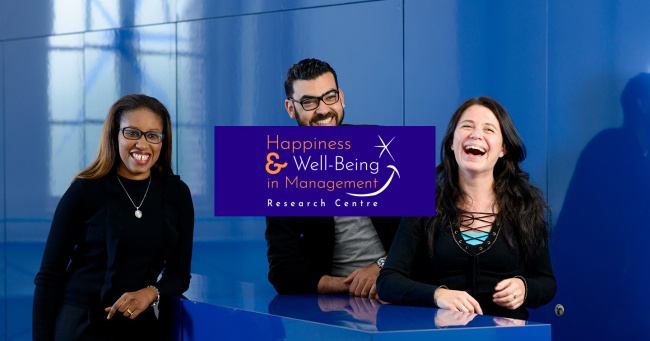Research Centre
Happiness & Well-Being in Management
Managers are urged to foster the happiness and the well-being of their stakeholders not only because it translates into a business strategy that leads to higher financial returns in the long run but also because it is the right thing to do ethically for individuals and society at large. However, many managers still struggle to audit, deliver or monitor well-being experiences and programmes.
Our research centre's goal is to provide managers with conceptual clarification and empirical evidence to help them enhance the well-being of their stakeholders accurately, efficiently and ethically. Through our research projects, we propose measures to assess well-being in different contexts, classifications of pleasurable and meaningful experiences, and reflections on the dark side of such practices as working remotely or practising mindfulness.
We are a team of professors specialising in Economy, Human Resource Management, Leadership, Marketing and Psychology and we are located on the Madrid, Paris and London campuses. We regularly publish academic papers in leading journals (e.g., Human Relations, Journal of Business Ethics, Journal of Marketing Research), and we disseminate our findings through professional press and networks (e.g., Les Echos, TheChoice, The Conversation). We also organise and participate in conferences, workshops and ad-hoc training for postgraduate students and executives.
We are driven by the desire to positively impact the academic, business and educational community we belong to.
Mission
The purpose of the research centre on Happiness & Well-Being in Management is to shed light on the drivers, consequences and underlying mechanisms of individual and collective well-being for leaders, employees, customers and society at large.
Specifically, the research centre on Happiness & Well-Being in Management focuses on three main questions:
- First, how to accurately assess happiness and well-being across countries, groups and individuals?
- Second, how to efficiently design, implement and monitor happiness and well-being experiences?
- Third, how to bring solutions to potentially harmful situations and behaviours induced by the pandemic or the excessive use of digital technologies?
While answering these questions, the research centre pays special attention to the potential differences among different groups (e.g., employee vs customer well-being) and different cultures (e.g., individual vs collective values).
Main Research Themes
Conceptual and operational definitions of happiness & well-being in management [measures of well-being]
How to accurately assess the well-being of my stakeholders?
This is a managerial question that could be addressed by researchers. However, the construct of well-being in management lacks a unified theoretical and operational definition. It generally encompasses different meta-level concepts, such as satisfaction with life, subjective well-being, psychological well-being, health or digital well-being. Some concepts are specific and objectively measured, such as health (e.g., physical, mental or social indicators), whereas others are more general and subjectively measured, such as psychological well-being (e.g., feelings of self-realisation).
Against this backdrop, our projects are aimed at: i) Reviewing the literature in management to better understand the existing conceptual and operational definitions of happiness and well-being; ii) Proposing reliable measures of happiness and well-being; iii) Testing the validity of the existing and proposed measures for different stakeholders (e.g., employee or consumer) in different cultural environments (e.g., Western vs Eastern countries).
Hedonic, pleasure-based and eudaimonic, meaning-based experiences of happiness & well-being [experiences of well-being]
How to deliver both pleasurable and meaningful experiences to my stakeholders?
This managerial question is critical to address the current needs for emotional, self-fulfilling and sustainable experiences. Drawing from the ancient Greek philosophical dichotomy between hedonia and eudaimonia, modern psychologists have underlined the characteristics of life experiences associated with respectively the hedonic, pleasure-based conception of happiness and the eudaimonic, meaning-based conception of happiness. Still, the characteristics of pleasurable and meaningful experiences in the management field need to be precisely discussed, defined and tested.
Against this backdrop, some of our projects are aimed at: i) Exploring the characteristics of the programs, experiences, products or services that may deliver pleasure-based and meaning-based benefits; ii) Testing the impact of those experiences designed, for example, for employees or consumers on productivity, engagement or loyalty; iii) Identifying the segments that may be more or less sensitive to those practices.
Mitigating the harmful consequences of stressful events or excessive behaviors [critical situations for well-being]
How to support my stakeholders during stressful events and help them minimise the negative consequences of some practices and behaviours?
The COVID-19 pandemic has induced new ways of working and consuming and has affected the physical, mental and social health of many individuals worldwide. Many uncertainties remain, and organisations may wonder how to address the following questions: What are the consequences of COVID-19 on the general well-being of our stakeholders? What are the well-being consequences of working remotely or buying online for our organisations? Which procedures or practices may be implemented to mitigate those negative effects?
Against this backdrop, some of our projects are aimed at: i) Understanding how individuals regulate their negative emotions and embrace new behaviours; ii) Measuring the negative consequences of some situations and behaviours on productivity, creativity, engagement or loyalty; iii) Identifying the bright and dark sides of some practices implemented to enhance well-being.


